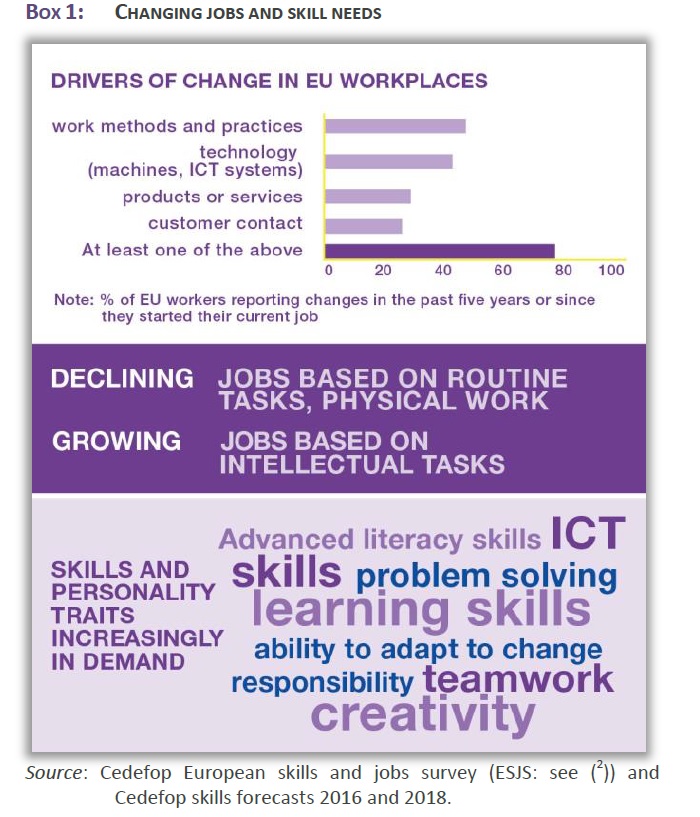Cedefop develops real-time skills intelligence by analysing online job vacancies
CEDEFOP – The skills that job providers want!
65% of children entering primary school today may ultimately end up working in completely new types of job that do not yet exist. Scott McLeod and Karl Fisch advanced this hypothesis several years ago in their widely discussed Shift happens analysis. While such findings may be hard to verify empirically, it is clear that labour market change has been accelerating in recent years and that dynamics go far beyond shifts in sectors and occupations.
The broad patterns of workplace transformation and of changing skill needs in today’s jobs are, however, visible and give us some clues as to likely future developments (see Box 1). For example, findings from Cedefop’s European skills and jobs survey show that 43% of EU workers have seen the technologies they use at work (machines, ICT systems) change in the past five years or since they started their current job; 47% experienced changes in their working methods and practices. Such trends, which are necessarily underpinned by an array of upskilling and reskilling measures, are likely to continue in the coming years.

Cedefop’s 2016 skills forecast revealed that jobs largely based on routine tasks are expected to decline, while jobs involving 21st century skills such as advanced literacy, ICT, problem solving and learning skills are projected to be on the rise. The 2018 skills forecast pointed to a reduction in physical work and an increase in intellectual tasks requiring communication and social skills. This projection is especially valid for jobs at the top and the bottom of the skills scale where human qualities can least be replaced by machines. The resilience of jobs requiring low skills and qualifications can be explained by the fact that these jobs often involve personal services (hotels, restaurants, caring and other proximity services) which are little affected by automation and globalisation
Nevertheless, technological change and automation are potentially disruptive. Some years ago, widespread concern about massive job destruction (up to 50% according to some estimates) dominated discussions; more recent evidence points to job losses in some segments coinciding with job growth in others. Among large global firms surveyed for the World Economic Forum’s The future of jobs report 2018, half expect automation to lead to some reduction of their workforce by 2022, while 38% expect to increase their workforce in emerging fields and one company out of four expects to create entirely new jobs.
In light of changing labour market needs, skills intelligence is crucial to designing, reforming and ‘future-proofing’ education and training programmes. Surveys of employers, workers, graduates or the wider population can be used to collect detailed information on skills. But they are costly and time-consuming to implement, requiring substantial conceptual development and response rates warranting representative findings. Other ‘traditional’ methods, such as forecasts, provide useful insights into medium and long-term labour market trends but, owing to the use of proxies and time-lags between data collection and obtaining results, they are less suitable for detecting employers’ changing skill needs early, for example to provide CVET relevant to labour markets.
Read more in Cedefop’s briefing paper.

Leave a Reply